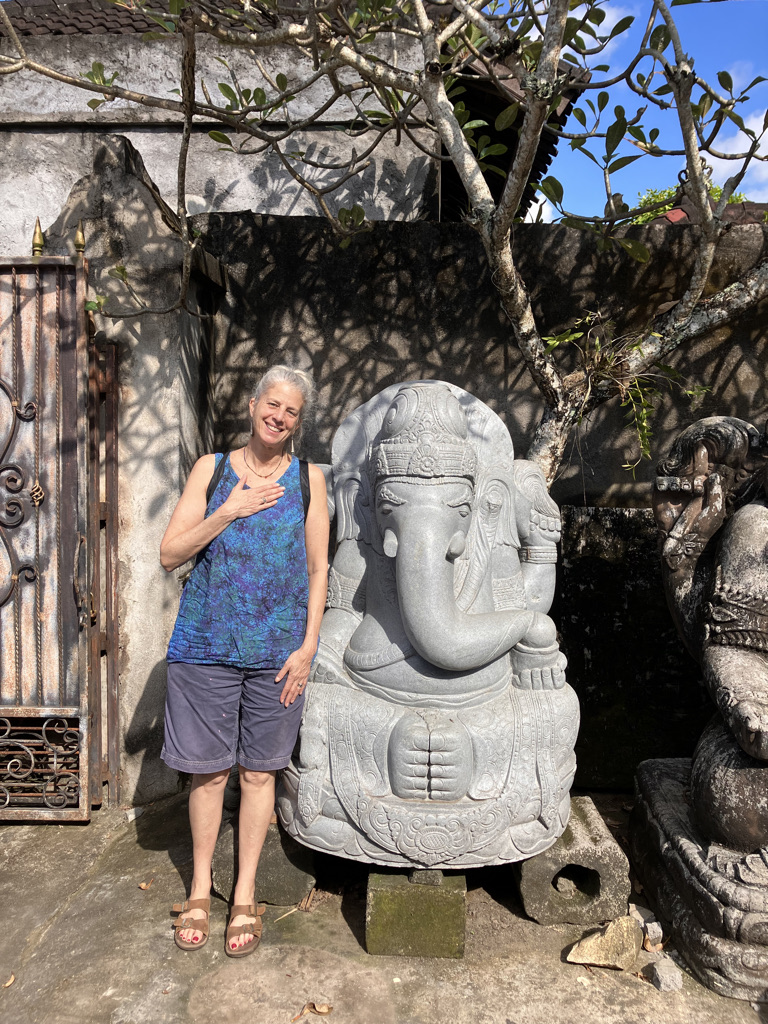How Lucky Are We?
Outside the window of my airplane, just beyond the tip of the wing, Mt. Agung popped her craggy rim through the cloud cover, exposing herself to the heavens. From my seat, 29 A, I felt as though she was winking at me “so long, see you soon.” Yesterday, as I departed my beloved Bali to return to my beloved Bill, waiting for me at home in Philadelphia, I cried. I cry every single time my plane roars to lift off, and equally hard when wheels are down on the tarmac. This was an extremely fast and full-on trip this year, under three weeks, and I worked my butt off every day finding treasures and visiting my artisans, broken up by precious reunions with old dear friends, cold beer, and scrumptious meals. In the local Balinese language there are many, many different words for the concept of balance, something to strive for. For me, a side perk of my office halfway around the world is that I can seek such balance, after sitting and sweating hours in long lines of traffic, with a massage and floral bath at the end of the day. Ah, to rebalance my body daily and soul annually is what beckons me to my beloved Indonesia. How lucky am I?
Though Bali has a better press agent and gets top billing for my show, work and journey each year, I also return to my other heart home of Yogykarta (Yogya), Java, to hunt for local batik treasures. This trip was with a dear old friend who used to live near me when I resided there in the early 90’s, and now she and her sweetie call Bali home. We three flew to Yogya in the same tongue and cheek way many Muslim “mudik” or return to their hometown at this time of year to celebrate Idul Fitri. The city was bustling per usual even though a half a million people were fasting for the holy month of Ramadan. Per tradition, you eat an early meal before sunrise, and then nothing again – no water, food, cigarettes, nothing – until sunset. Come late afternoon, when everyone’s blood sugar has bottomed out, I am always amazed that there aren’t more road rage incidents or soundly sleeping old people on the side of the road. Instead, there is an ebb and flow of deeply practiced rituals so foreign to most Americans. Every time I am home for Ramadan, I recall many of my fellow US Jews kvetch (complain) about how hard it is to fast for Yom Kippur, our holiest of holidays, a fast that last a whole long day. Oh, the suffering. Try doing that but on repeat for 30 days in a row. On one day of work close to sunset, we were at a red light in the car of my long-time driver. Mas Ismudi, as the city was preparing for “opening of the fast.” At exactly 5:46 PM, through open windows of stopped cars, fellow fasters shared trays small, sweet bites, and hot sugary tea to ceremonially end their day of fasting. When the light turned green, no one leaned on their horns, but allowed the flow of the first tastes to fuel their bodies and souls for the ride home.
On our last night of our Yogya trip was the 70th birthday party for an old friend of Linda’s, who I also knew back in the day. She hosted us all in her home and invited a local band that is famous for playing Rolling Stone covers. Ever since I moved from in Yogya, in 1994, almost every week this very band has played “Satisfaction” and more, and the lead singer continues to belt out like Jagger with an open shirt, rake thin and wicked harp playing, seamlessly ageless as Javanese Mick. Many of the friends were people I hadn’t seen in 30 years: so much fun as we danced the night away like Wild Horses. The next morning, as we prepared to head to the airport to fly home to Bali, Mt. Merapi, the active volcano just north of the city, emerged from her cloud cover of the past week and rose triumphantly on the horizon in the early morning light. I delighted in her glory, noting the tiny wisps of steam escaping the top of the caldera as I shyly nibbled on my breakfast so as not to disrespect the locals beginning their fast nearby.
Ubud, my home base in Bali, held a major temple ceremony this month. Each day last week the village was teeming with celebration and long processions through the streets filled with music, chanting, prayers, glorious dress, and gilded barongs. To be a witness to such spectacle never ceases to delight me. These ancient rituals alone give me a sustained faith that even considering yet another onslaught of way too many tourists on this tiny island, the Balinese practice of their Hindu Dharma Religion is their solid foundation to resist the evils afoot. The current threat is the invasion of huge masses of Russian (and Ukraine) tourists (excuse the broad-brush stroke here: see article below). I almost wrote “visitors”, but the notion of being a visitor means you are a respectful guest in someone’s home, and in most Indonesians’ eyes, the Russians are far from that. Since the start of the Ukrainian war, well over 10,000 Russians have gotten visas to stay in Bali where it is far from the front lines (sparing many young men fighting & dying for Putin’s senseless war), with cheap living and lovely weather, while surrounded by fellow countrymen. They have brought their rubles and bought vast tracts of land, some active rice fields, building villas upon villas. Many other visitors have built homes in Bali, but the scale of the Russian development is astounding, and the earth under siege cannot breathe. Above the surface, the Russians’ blunt, direct affect is almost in stark contrast to the Balinese soft, deflective, accommodating nature. Here lies the one of the conflicts: Ideally, if one travels halfway around the world to be a guest in someone’s home island, should we not adapt to, or at least respect, the local traditions? It is not for me to say what is best for the Balinese to manage their way out of this scary time, but the murmurs and angst my local friends shared with me this month is troubling at best. For centuries and centuries, Indonesians have been colonized by foreign entities and yet have managed to maintain their integrity and culture. From the depths of my white Balinese spirit, through the wafting incense and ritual ringing of the gong, I hope their inner strength prevails.
This week, my return journey from Indonesia was my 23rd airplane flight since the first of the year. Mostly for good reasons and sprinkled with hard ones – aging parent visits and honoring lost loved ones – I have flown more in the past four months than most do in a year or two. Such a privilege to be able to be out and about again, seeing the world beyond our front stoops. Walking among strangers who all outwitted the pandemic to be able to taste a home-cooked meal from a kitchen across the world. How fortunate are we? Standing in queue for security, wondering if the sweet couple in front of me were high school sweethearts or did they meet on Tinder? As I wander through the terminal, I note destinations on departure boards foreign even to my well-traveled passport, and all those souls lined to fly there pique my interest. I have traveled most of my adult life, feeding my wanderlust with physical journeys dovetailed with imaginary ones. When I hear people complain about how much they hate to fly these days I pinch myself as how damn lucky I am. How lucky are we all, let us not forget.
Much love to all my fellow travelers.
NY Times: I’m Sorry, We’re From Moscow. In Bali, Warring Sides Learn to Cohabitate



